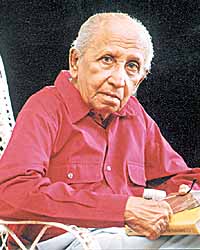By
Tisaranee Gunasekara
“Too many things have happened that weren’t supposed to happen and what was supposed to come about has not.”
– Wyslawa Szymborska – The Century’s Decline
For a few hours in early April, 2022, Wikipedia page of Ajith Nivard Cabraal described the then Governor of Central Bank as: “A chartered accountant and the principal scum bag responsible for the current economic crisis in Sri Lanka.” Wikipedia also named the Finance Minister of Sri Lanka as Basil Kaputa Rajapaksa and listed money laundering as a family tradition of Minister Namal Rajapaksa.
According to internet reports, this creative editing was the work of unnamed Lankan teenagers prevented by their parents from taking part in the burgeoning protests.
Those were desperate times, and unprecedented ones. According to surveys, more than 90% of Lankans experienced some form of economic distress, from familiar poverty to unthinkable shortages. Primordial and socio-economic cleavages that kept people divided collapsed into the general ferment of want and despair. And from that national condition, the Aragalaya was born.
On 9 April, Occupy Galleface began. On 9 May, in response to a Rajapaksa-sanctioned attack on Gota-go-gama, people across the country unleashed mayhem on ruling party politicians. On 9 July, around a million Lankans converged on Colombo and forced President Gotabaya Rajapaksa to flee.
9 June was relatively quiet. Basil Rajapaksa resigned, promising to return. But people didn’t occupy the streets as they had done on 9 April and 9 May. Gota-go-gama activists were as militant as ever. But Lankans were in a wait-and-see mood. Their fury had been appeased by the mob violence of 9 May. The departure of Mahinda Rajapaksa and new prime-minister Ranil Wickremesinghe’s frank acknowledgement of the crisis had generated a modicum of hope.
Between 9 June and 9 July, hope died, reviving anger. The crisis was worsening. Instead of dealing with queues, President Gotabaya busied himself undermining PM Wickremesinghe and sabotaging the proposed 21st Amendment aimed at reducing excessive presidential powers.
In a clear sign of the coming avalanche, irate consumers, many of whom waiting in queues up to 20 days, ringed the Galle Stadium with empty gas cylinders ahead of the Sri Lanka-Australia test match. But all omens were lost on the Rajapaksas, until the human deluge reached their doorstep.
On 19 April, when people were protesting against the unavailability of fuel in Rambukkana, the police shot to kill and killed Chaminda Lakshan, father of two and the sole breadwinner of this family (Last month, the Human Rights Commission handed over its report on the incident.
Its recommendations include identifying the exact officer who fired the killer-shot and taking legal action against him and paying compensation to the family of Lakshan and those who suffered injuries from the attack. Whether the ministers in charge of Police and Justice heed these recommendations, and whether the Opposition takes up this cause remain to be seen).
The Bastille which stood for 400 years as a symbol of absolute power and unleavened tyranny fell in less than a day, between morning and evening of 14 July 1789. It was conquered by 900 citizens, many of them tradesmen. A few months later, the great Versailles Palace fell to an army of mostly Parisian women armed with anger and desperation.
Tear gas and live bullets are effective when protestors are limited to thousands, not when they number in hundreds of thousands, and not when they could include your family and your superior officer’s family, marching side by side.
The key is the public mood. When the general public is largely indifferent, repression is possible. When the public is a seething volcano, the police and the army will not obey orders to shoot even if orders are given.
Continue reading ‘Freedom,Safety,Order and Democracy are the basic pillars of a liveable life. So far, all attempts to reignite the Aragalaya have failed, because Wickremesinghe has got enough of the combination right. A kind of normalcy has replaced generalised chaos.So it is too early for Aragalaya Season 2.’ »







































